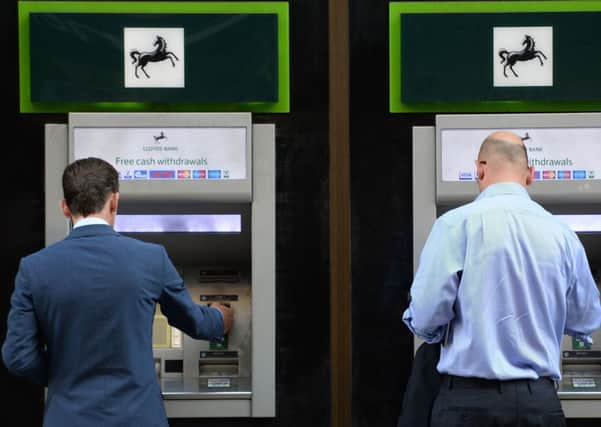YP Comment: Banks and their debt to society. Brexit blamed for Lloyds cuts


Even though the firm’s Twitter account stressed the decision to cut another 3,000 jobs, and close an additional 200 branches, was taken before the Brexit vote on June 23, chief executive Antonio Horta-Osorio did blame the “uncertain” outlook.
These mixed messages will not endear the state-backed Lloyds hierarchy to its staff – these cuts are in addition to the 4,000 roles earmarked for the axe earlier this year – and its customers who had to bail out the banking industry at the height of the financial crisis. Yet, while some of the cuts can be attributed to changes in customer behaviour as more people bank online, Lloyds did still post a profit of £2.5bn and safeguards are needed to ensure that clients, particularly the elderly and others without internet access, can still access a branch with relative ease.
Advertisement
Hide AdAdvertisement
Hide AdEven though Harriet Baldwin, the then Exchequer Secretary, told Parliament last month that a good branch network remains “essential”, she did admit: “I need to start with a confession. I am a rural Member of Parliament. I spend four days a week up here in London. If I think about it, I actually cannot remember when I last went into a bank branch. I have been to the cashpoint, here and in my constituency, but I also ask myself when, these days, do I even use cash? The only place seems to be in the House of Commons Tea Room. I understand contactless is coming there soon, so where will we all be then?”
A remark which went to the nub of the issue, the British Bankers’ Association and the Government must ensure that existing protocols are fit for purpose, particularly when it comes to the proposed closure of the so-called ‘last bank in town’ so this only occurs as a very last resort. Given the likelihood of further closure announcements by rivals to Lloyds, and the banking sector’s continuing debt to society, the public interest demands nothing less.
Irony of Brexit
IT was slightly ironic that areas like South Yorkshire voted in favour of Brexit on June 23 when Sheffield, and the surrounding area, had been one of the primary beneficiaries of European Union regeneration budgets.
Voters clearly believed the EU, and partner agencies, were only allocating money to specific schemes with hard-earned money that taxpayers had previously paid to the UK government – and that they want Ministers in this country to determine priorities.
Advertisement
Hide AdAdvertisement
Hide AdThese are not small sums. The Local Government Association estimates that up to £5.3bn is waiting to be allocated to the most deprived parts of the country and it wants assurances that this process will not become bogged down by political machinations in London and Brussels.
It is right to issue this warning. Existing commitments must be honoured in full – Britain will still be a member of the European Union for the foreseeable future and Theresa May has still to invoke Article 50, the two-year process which will pave the way for this country’s exit from the EU.
However, when these deliberations begin, it will be incumbent upon the Government to provide clarity on how it intends to reallocate money previously given to the EU. There will be many competing demands, not least the NHS and farm subsidies, but economic regeneration will be pivotal if economically disadvantaged areas are to prosper in Brexit Britain.
Alcohol angst at airports
GIVEN the growing concerns over the number of inebriated passengers boarding aircraft, and the risk that this poses to safety as the Government instigates yet another review, is it time for Leeds Bradford Airport and others to take more drastic action and close down the licensed premises which are such a prominent feature of departure lounges?
Advertisement
Hide AdAdvertisement
Hide AdOnly a small proportion of travellers partake in an alcoholic beverage before take-off, but it is now clear, from those high-profile recent incidents which have resulted in court action, that there still exists a reckless and irresponsible section of society who do not know how to drink – and behave – sensibly without endangering others. That said, it is not just the airports to blame – some passengers are worse for wear before they get to check-in because of the tendency for stag-dos, hen parties and other jaunts to involve overseas travel. In this regard, perhaps more random breathalyser tests are also a necessary but regrettable safeguard.